

English learning your child will always remember. The British Council is proud to present an innovative approach to learning English for 2-6 year olds in partnership with Oscar®award-winning animators Aardman.
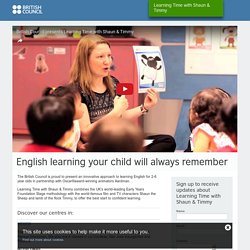
Learning Time with Shaun & Timmy combines the UK’s world-leading Early Years Foundation Stage methodology with the world-famous film and TV characters Shaun the Sheep and lamb of the flock Timmy, to offer the best start to confident learning. Discover our centres in: Mexico The team in Mexico are thrilled to welcome you to our centre in Mexico City based in Parque Interlomas. We also teach classes in La Condesa, San Jose Insurgentes and Polanco. Parque Interlomas, Ave. Kids' Place, Mazatlan # 173 (esq Alfonso Reyes.), Colonia Condesa, Mexico City. MIMOS Sur: José María Velasco #100, San José Insurgentes, Mexico City.
MIMOS Polanco: Rubén Darío #30, Polanco, Mexico City. Email contacto@britishcouncil.org.mx to sign up for a free taster class. Katong, Singapore 112 East Coast Road, #03-16 112 Katong, Singapore 428802 Santiago, Chile. LearnEnglish Kids - British Council. Don't Expect Toddlers To Behave Consistently — They Literally Can't. Can Free Play Prevent Depression and Anxiety In Kids? Over the past 50-60 years, play time in kids’ lives has been drastically cut.
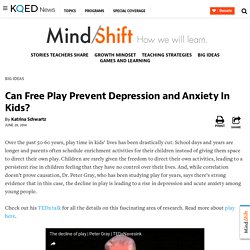
School days and years are longer and parents often schedule enrichment activities for their children instead of giving them space to direct their own play. Children are rarely given the freedom to direct their own activities, leading to a persistent rise in children feeling that they have no control over their lives. And, while correlation doesn’t prove causation, Dr. Peter Gray, who has been studying play for years, says there’s strong evidence that in this case, the decline in play is leading to a rise in depression and acute anxiety among young people. Check out his TEDx talk for all the details on this fascinating area of research. Why Empathy Holds the Key to Transforming 21st Century Learning.
By Thom Markham Like other aspects of modern life, education can make the head hurt.
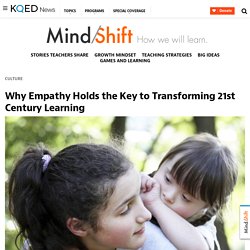
So many outcomes, so much important work to do, so many solutions and strategies, so many variations on teaching, so many different kinds of students with so many different needs, so many unknowns in preparing for 21st Century life and the endless list of jobs that haven’t been invented. What if we discovered one unifying factor that brought all of this confusion under one roof and gave us a coherent sense of how to stimulate the intellect, teach children to engage in collaborative problem solving and creative challenge, and foster social-emotional balance and stability—one factor that, if we got right, would change the equation for learning in the same way that confirming the existence of a fundamental particle informs a grand theory of the universe? That factor exists: It’s called empathy. To make that argument requires a deep dive into the profound nature of empathy.
The takeaway? Which Early Childhood Experiences Shape Adult Life? By Maanvi Singh, NPR Most of us don’t remember our first two or three years of life — but our earliest experiences may stick with us for years and continue to influence us well into adulthood.
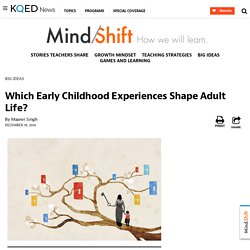
Key Person & Attachment - Early Years Matters. The Key Person Children thrive from a base of loving and secure relationships. This is normally provided by a child’s parents but it can also be provided by a key person. How Are Happiness and Learning Connected? As teachers, we also know that when students' affective filters or defenses are sky high, fight or flight responses will be modus operandi.
A room full of defensive behaviors (withdrawn, angry) is a sad, unproductive place to teach and learn. Page from English in Early Childhood - British Council. Page from English in Early Childhood - British Council. One theory all teachers with disruptive children should know about. Imagine a classroom where children are unable to wait their turn or stay focused on their work.
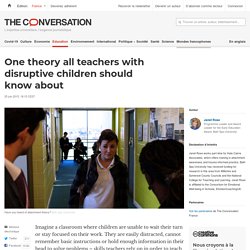
They are easily distracted, cannot remember basic instructions or hold enough information in their head to solve problems – skills teachers rely on in order to teach successfully. These behavioural issues are all examples of problems that can arise from attachment issues – based on the relationship between children and their main caregiver. Attachment theory is now one of the world’s most well-researched theories about human development. It was first proposed by the 20th-century British psychiatrist John Bowlby, who considered that children needed to develop a secure attachment with their main caregiver via sufficiently consistent, responsive, sensitive, appropriate and predictable care and support.
Research has shown that secure attachments create mental processes that enable a child to regulate emotions and attune to others. Trauma takes its toll. School Radio - Nursery songs and rhymes. Music and Movement Activities for Toddlers and Preschoolers. 45+ Quick & Easy Kids Crafts that ANYONE Can Make! LearnEnglish Kids. LearnEnglish Kids. How to teach children English using illustrated storybooks. What makes illustrated storybooks such a good resource for teaching young learners of English?
The British Council’s Gail Ellis, co-author of a storytelling handbook for primary English language teachers, explains. Listen to an interview with Gail in our podcast and register for her webinar taking place on Thursday, 2 October. Illustrated storybooks provide an ideal resource for helping children learn English. This is because children love listening to stories. Practical tips. By Opal Dunn, educational consultant and author Introduction Young children learn English differently from most adults.

Most have an innate ability to pick up English while taking part in activities, by making sense of what they are doing and picking up the adult’s language that accompanies the activity. You can find out more in the British Council booklet ‘How young children learn English as another language’, also available on the parents pages of the LearnEnglish Kids website.
Planned English sessions. Page from English in Early Childhood - British Council. Page from English in Early Childhood - British Council. Ten ways to support your child’s English-learning at home. Page from English in Early Childhood - British Council. Talking with Babies and Toddlers June05. PowerfulInteractions. The power of positive relationships. How can parents and teachers best educate young children? What principles can both teachers and parents bring to the education of very young children? Gillian Craig, who was part of the Learning Time with Shaun and Timmy writing team, explains. As teachers and parents, we follow certain principles in our roles. Often though, these principles overlap and all we need to do is recognise and reinforce these areas.
Ask (the right) questions When my daughter came out of her class one day shortly after her course started, I asked her, 'What did you do in class today? '. Although my daughter is only two years old, (and more experienced parents than me would not have asked such a broad question to start with), questioning our children at any age about what they have done in class is a natural thing to do. Similarly, a child’s artwork can provide a prompt for asking questions: 'What (or who) is it? ' Teachers also want their students to reflect on their lessons, but with young children especially, this is a learned skill. Reinforce desirable behaviour. Carol Dweck: The power of believing that you can improve.
Page from English in Early Childhood - British Council. Scientists Say Child's Play Helps Build A Better Brain : NPR Ed. Deion Jefferson, 10, and Samuel Jefferson, 7, take turns climbing and jumping off a stack of old tires at the Berkeley Adventure Playground in California.
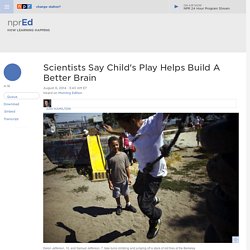
The playground is a half-acre park with a junkyard feel where kids are encouraged to "play wild. " David Gilkey/NPR hide caption toggle caption David Gilkey/NPR Deion Jefferson, 10, and Samuel Jefferson, 7, take turns climbing and jumping off a stack of old tires at the Berkeley Adventure Playground in California. This week, NPR Ed is focusing on questions about why people play and how play relates to learning. When it comes to brain development, time in the classroom may be less important than time on the playground. "The experience of play changes the connections of the neurons at the front end of your brain," says Sergio Pellis, a researcher at the University of Lethbridge in Alberta, Canada.
Different types play. Importance of play for babies & children. Play is more than just fun for babies and children.
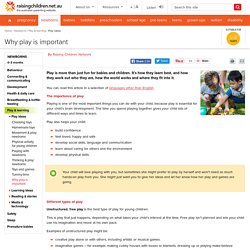
It’s how they learn best, and how they work out who they are, how the world works and where they fit into it. You can read this article in a selection of languages other than English. The importance of play Playing is one of the most important things you can do with your child, because play is essential for your child’s brain development.
The time you spend playing together gives your child lots of different ways and times to learn. How young children learn English through play. As we release Learning Time with Timmy – our first app for early-years learners of English – Danitza Villarroel, a teacher on our Learning Time with Shaun and Timmy course in Chile, explains the importance of learning through play, and offers a few tips for teachers new to this age group. Teaching English to pre-school children can be daunting for teachers new to this age group. Young children have shorter attention spans than older children and adults, and they're still learning their mother tongue.
But teaching these learners can be enormously rewarding once you've taken a few basic principles on board. The importance of active learning. ZERO TO THREE. Page from English in Early Childhood - British Council.